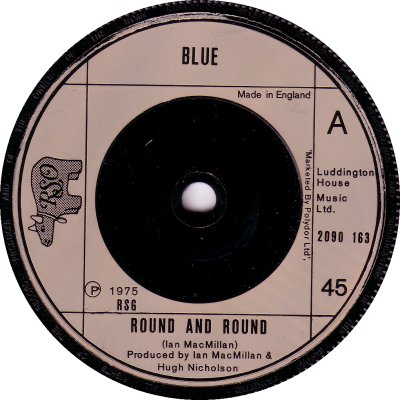
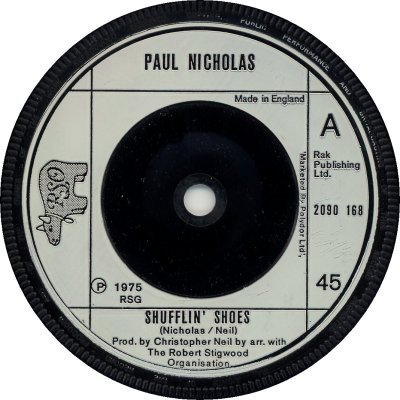
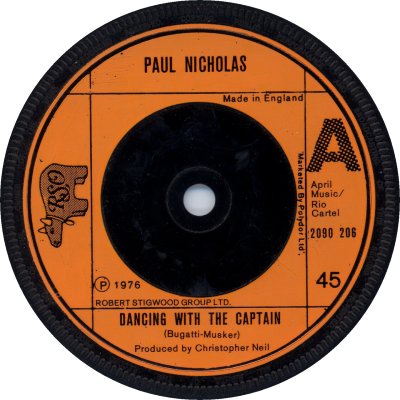
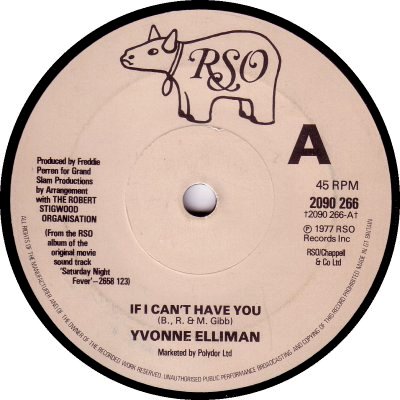
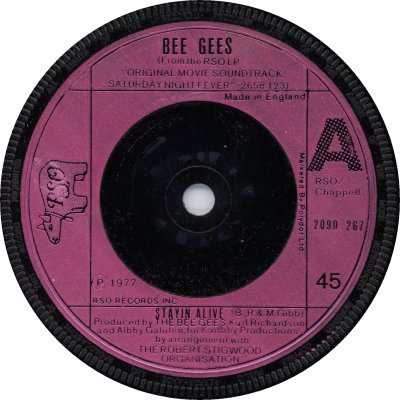
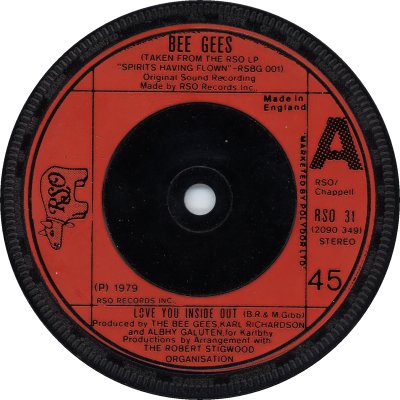
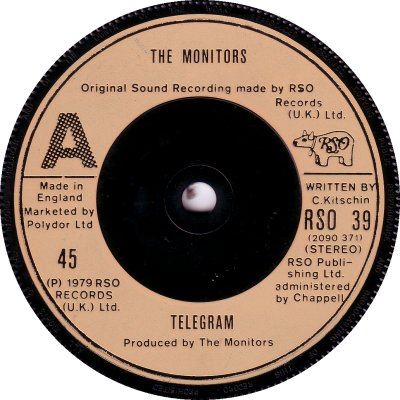
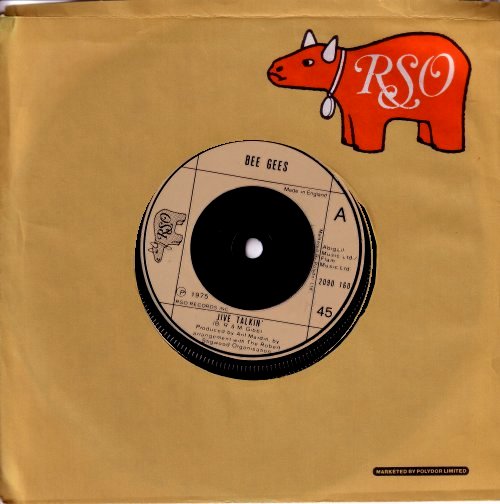
One of the labels of the Robert Stigwood Organization, and the successor to the '60s-only Reaction. Robert Stigwood founded his Organization the late '50s or early '60s as a management agency. By the mid '60s it had expanded its interests to include record production, and in 1966 he took advantage of Polydor's new strategy of giving independent producers their own labels and started the Reaction label. The first mention of Reaction in 'Billboard' came in the issue of the 22nd of January 1966, which named Stigwood as its founder and said that Polydor would be handling its pressing and distribution. The presence of The Who and Cream on the new label brought it immediate success, but The Who moved to Track Records (q.v.) by May 1967 and Reaction seems to have lost impetus. Its final single came out late that same year, after which Stigwood switched his clients Cream and Oscar to the main Polydor label. In what was to prove an important move he signed The Bee Gees in early 1967; their records under his management came out on Polydor at the time rather than Reaction, which was perhaps a sign of Reaction's impending redundancy.
Stigwood had ambitious plans. 'BB' of the 7th of January 1967 reported that he had formed the Hamburg-based Stigwood-Yaskiel International promotion / production / licensing company with Lawrence Yaskiel, and then three weeks later came the news that the Robert Stigwood Organization had amalgamated with Brian Epstein's NEMS company. The two men were to be joint managing directors, with Epstein doubling as chairman; NEMS was to have rights to RSO products but Stigwood was to be in charge of matters pertaining to records made through Polydor and no switching of artists was to take place ('BB', 28th January). The arrangement was doomed to be cut short, thanks to Epstein's untimely death in the summer, after which a split took place. 'BB' of the 11th of November revealed that NEMS and Stigwood were to part company amicably at the end of the month, and that Stigwood was launching the Robert Stigwood Organization in America with the co-operation of Grammophon-Philips. According to the article the Bee Gees and Cream were going to be joining the new company, and Reaction was going to be a part of it. Reaction appears to have been shelved, however, as mentioned above, and records by RSO artists came out on Polydor from the start of 1968.
There were further developments in 1968. 'BB' of the 25th of May described RSO as 'rapidly expanding' and said that it had set up two new corporations in Los Angeles: Stigwood-Fitzpatrick Inc and publisher Casserole Music. The following month 'BB' of the 20th of June added that RSO of London had been involved in the formation of a new management company, and by the autumn of 1970 RSO had American offices in New York as well as Los Angeles ('BB', 1st August 1970). During this time the Bee Gees were going from strength to strength and sales of their records were booming. Despite the success there were pressures. 'BB' of the 29th of August said firstly that the Robert Stigwood Group had signed a three-year contract with Deutsche Grammophon, promising LPs by Cream, Ginger Baker and Jack Bruce as well as the Bee Gees, and secondly that the company intended to go public at the end of the month. In his book 'American Popular Music And Its Business, from 1900 to 1984' Russell Sanjek attributed the latter move to the UK's 'heavy' tax laws, which, he said, had left RSO 'virtually beggared' despite its making high profits. He added that when it took place the share issue 'attracted little interest', a view shared by 'BB' of the 13th February 1971 which described the flotation 'last August' as 'disastrous'. Incidentally the music press seems to have used the terms 'Robert Stigwood Group' and 'Robert Stigwood Organization' more or less interchangeably. They appear to have been separate but very closely related.
Despite the setback RSO kept on finding new business. 'BB' of the 21st of November 1970 said that its New York branch was to jointly manage the 'Jesus Christ Superstar' album and that composers of the rock opera Tim Rice and Andrew Lloyd Webber had signed a five-year contract with a specially-formed subsidiary of the Robert Stigwood Group. 'Superstar' was to prove wildly popular, and RSO had to devote a lot of energy to protecting its performing rights in the USA ('BB', 25th December 1971). The company's interests had widened to include films and theatre: 'BB' of the 13th of February 1971 mentioned 'Up Pompeii', 'Up The Chastity Belt' and the sequel to 'Till Death Us Do Part', while 'BB' of the 1st of July 1972 observed that RSO had a live theatre division. In terms of the relative contribution of the various arms, however, the company's activities were somewhat imbalanced, and early in 1971 it was noted that that its London office was shedding staff because so much of RSO's income was coming from America ('BB', 20th February).
The first signs that a new record label was on the way came in 'BB' of the 19th of June 1972, which claimed that it would be called RSO and that its launch was scheduled for September. 'Music Week' of the 5th of August agreed with the date and said that the label would be handled by Polydor. It added that Cream, Eric Clapton and the Bee Gees were all signed to the Robert Stigwood Group. There must have been a delay, as September came and went without any action. Then 'BB' of the 13th of January 1973 put forward a new starting date of March and said that David English, who had joined as label manager, was now to be general manager. This time the date proved to be accurate. 'BB' of the 17th of March had time to say that the newly-formed RSO label had made its first signing, a Scottish trio called Blue, and then on the 30th the first RSO single came out - it was 'Saw A New Morning' b/w 'My Life Has Been A Song' by the Bee Gees (2090-105; 3,73). Catalogue numbers were in a 2090-100 series, following Polydor's usual seven-figure pattern; 101 and 102 (by West, Bruce and Laing) were overseas-only and 103 and 104 came out shortly after 105.
Unfortunately for RSO the Bee Gees had hit a lull as far as hits were concerned. After 'Run To Me' b/w 'Road To Alaska' (Polydor, 2058-225; 7/72) reached the No.9 position in July 1972 their next and final single for Polydor, 'Alive' b/w 'Paper Mache, Cabbages And Kings' (2058-304; 11/72) had failed to chart. 'Saw A New Morning' and their three subsequent singles were all misses, and it wasn't until the summer of 1975 that they were to make a return to the Charts. It was Eric Clapton who gave RSO its first hit single, when his version of 'I Shot The Sheriff' b/w 'Give Me Strength' (2090-132; 7/74) reached the No.9 spot in July 1974, some sixteen months after the label's launch. He went on to add three more hits in minor positions, interspersed with misses. The Bee Gees improved on that placing by hitting the No.5 position in June 1975 with 'Jive Talkin'' b/w 'Wind Of Change' (2090-160; 5/76), and Barbara Dickson scored a No.9 hit with 'Answer Me' b/w 'From Now On' (2090-174; 11/75) early in 1976. Pickings were fairly slim, nonetheless, but they were soon to improve.
During the latter part of 1975 and the start of 1976 a big change took place, one that seems to have been hardly reported at the time. According to Russell Sanjek in the book referred to above, in May 1975 Warner Communications made an offer for the 'recently reformed' Robert Stigwood Organization, in which Polydor had a 26% holding. PolyGram countered with an alternative offer, which would give Stigwood a place on the board, a guaranteed income from his various music companies, royalties from all American-recorded RSO products and a five-year investment in the acquisition and development of screen properties. The PolyGram offer was successful, and they eventually purchased 8 million RSO shares at $1 each. 'Music Week' of the of March 1976 noted that the takeover by PolyGram was due to be completed 'by the end of last week', but apart from that the development doesn't seem to have caused any ripples of interest. Some time later 'BB' of the 4th of February 1978 observed that PolyGram's 'total ownership' of the RSO label had been kept quiet in the US but that it 'goes back several years' and involved RSO's record division in its entirety as well as a substantial part of the company's film interests.
Around the time of the PolyGram takeover the name of Al Coury began to be linked with RSO - several online sources credit him as co-founder of the label alongside Robert Stigwood but he doesn't seem to have been involved with it until that point. After spending seventeen years with Capitol he became president of RSO, presumably at the invitation of the company's new owners. Under his guidance RSO gained its second wind, and the hits began to flow. As early as 1977 'BB' remarked on 'the mounting stature of the RSO link within the PolyGram group'. As if in confirmation of this, the Bee Gees found a new direction and from the autumn of 1977 became regulars in the Charts, thanks in part to the success of the film 'Saturday Night Fever'. They began with a run of five Top 5 singles including two No.1s, the first of them, 'Night Fever' b/w 'Down The Road' (RSO-002; 4/78), supplying the company with its first chart topper. Another film which was to prove a phenomenon and to spawn a number of big hit singles for RSO was 'Grease'. Its stars John Travolta and Olivia Newton-John scored back-to-back No.1s as a duo in 1978 with 'You're The One That I Want' (RSO-006; 5/78) and 'Summer Nights' (RSO-19; 9/79), while Frankie Valli's 'Grease' (RSO-012; 8/78) got to No.3, and Olivia Newton-John hit the No.2 spot on her own with 'Hopelessly Devoted To You' - all had music from the film on their 'B' sides. In addition Yvonne Elliman, Paul Nicholas and Andy Gibb provided several lesser hits each, and between early 1976 and the end of the decade there were solitary successes by Linda Clifford, Rick Dees & His Cast Of Idiots, Player, John Stewart, Thom Pace and David Naughton. 'BB' of the 24th of February 1979 named the soundtracks to 'Saturday Night Fever' and 'Grease' as the best selling albums of the previous year, with 'You're The One That I Want' and 'Summer Nights' being the second- and third-best selling singles after Boney M's 'Rivers Of Babylon'. In addition, 'BB' of the 29th of June 1979 observed that in the three years of Coury's presidency RSO had enjoyed fifteen No.1 singles in America.
Perhaps inevitably the standard of success achieved in 1978 fell away in 1979, with only the Bee Gees breaking into the UK's Top 20; they did so twice, and 'Tragedy' b/w 'Until' (RSO-27; 2/79) provided the group and RSO with another No.1 single. The 'Sgt. Pepper's Lonely Hearts Club Band' film, released in the summer of 1978, failed spectacularly to live up to the popularity of 'Saturday Night Fever' and 'Grease', and 1979's 'Moment By Moment', a film starring John Travolta, flopped. In the summer of 1980 'BB' of the 9th of June reported Coury as saying that rumours that RSO was being fully acquired by PolyGram were 'absolutely not true' - presumably he was referring to the parts of the organization that PolyGram didn't already own. Despite that reassurance RSO was absorbed by PolyGram in 1981, and Coury set up his own company, Network Records, late that same year. As an entity RSO seems to have lost momentum, and it disappeared from the scene in or around 1984.
One label design served for much of the '70s. It generally came in a fawny brown colour which at times drifted towards concrete, though occasional examples can be found in other colours such as orange-brown, purple, silver, white, gold and red, some of which are shown above. In July 1979 a rather cramped design with a smaller logo was adopted (7). Injection moulding was the norm and was carried out by Phonodisc, but a result of custom pressings by other companies paper-labelled copies of some popular singles can be found (4). There was a company sleeve (8). As stated above, singles started out being issued in a 2090-100 series in Britain, but in 1978 Polydor and Phonogram phased out the use of seven-figure listings. RSO's numbers were changed to the RSO-000s, the initial '0' being dropped after RSO-017. The discography below only covers the 1970s.
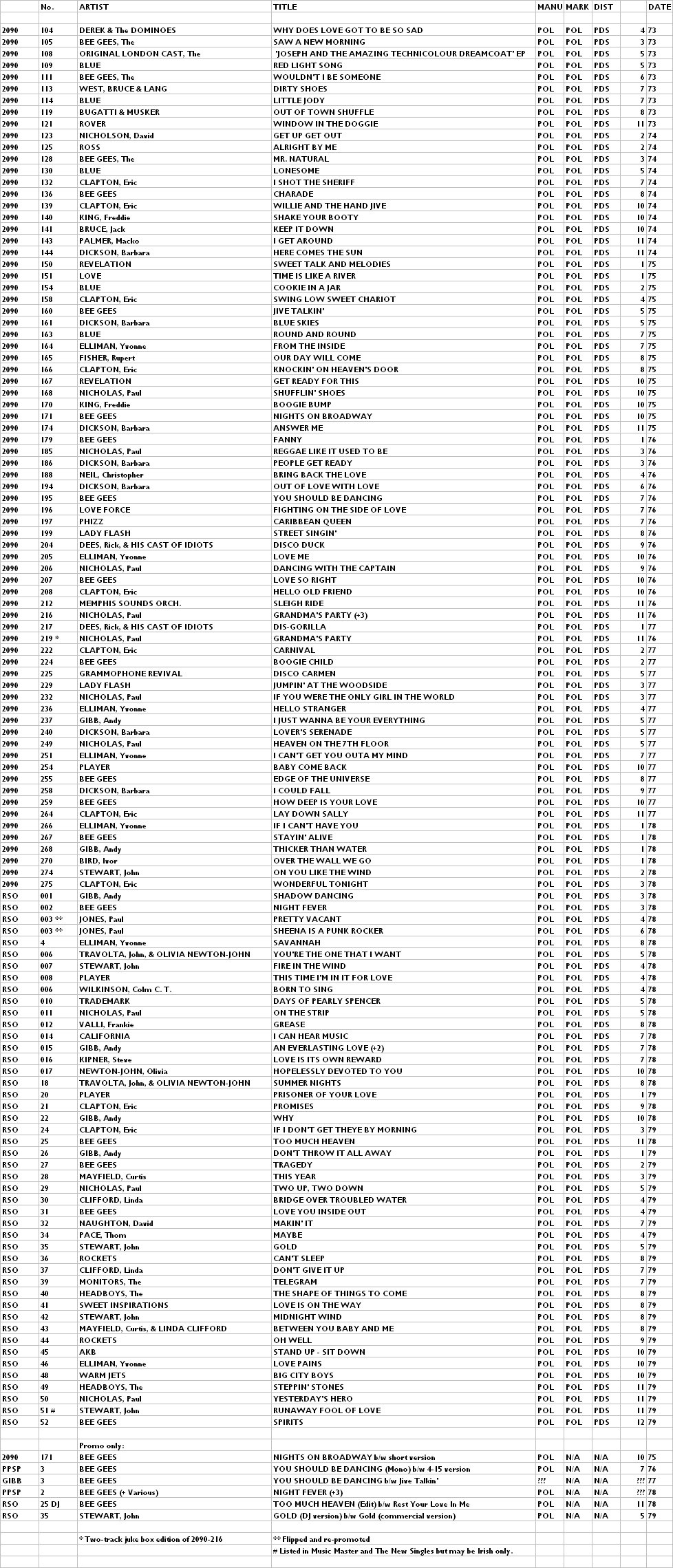


Copyright 2006 Robert Lyons.

